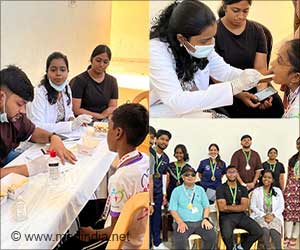A British girl who had a donor heart grafted onto her own after suffering cardiac failure as a baby has had the transplant removed and is living a healthy life with her own heart, doctors said Tuesday.
The case of Hannah Clark is thought to be the only one in the world where a child's failing heart recovered enough for the donor organ to be removed, the British surgeons told reporters ahead of their report in The Lancet journal."The possibility of recovery of the heart is just like magic," said Professor Magdi Yacoub of Imperial College London, who treated Hannah from the beginning and co-authored the journal paper.
"A heart which was not contracting at all at the time we put the new heart to be pumping next to it and take its work, now is functioning normally."
Hannah, now 16, suffered as a baby from severe heart failure due to cardiomyopathy, a problem with the muscle of the heart, and in July 1995, when she was two years old, doctors transplanted a donor heart next to hers.
The new organ soon took over much of the functioning of her own heart and Hannah, from near Cardiff in Wales, began to recover.
However, she suffered from a type of cancer known as EBV PTLD, a common side effect of the drugs given to transplant patients to stop their immune systems rejecting new organs.
Advertisement
In contrast however, her own heart recovered and began functioning normally.
Advertisement
Thirty-nine months later, Hannah has completely recovered from the cancer and her heart is functioning normally.
Yacoub and the team responsible for her remarkable treatment said her case offers vital clues to the study of transplantation, heart recovery and malignant disease.
The report's co-author Victor Tsang, a consultant at Great Ormond Street children's hospital in London, noted the research was also useful in the development of temporary artificial hearts for children suffering from cardiomyopathy.
"It is possible for the patient's own heart to make a full recovery if it is given adequate support to do so," he said.
"This is an important piece of knowledge as we are now gaining more experience with mechanical support for the failing heart in children."
Hannah has just completed her GCSE exams and is heading into the final two years of high school where she plans to study childcare. She goes out with friends, plays sport and has a part-time job working with animals.
"I wouldn't be here if it wasn't for any of this," she told reporters.
Hannah had to take about seven tablets morning and night for the immunosuppression treatment, went through several rounds of cancer treatment, suffered kidney failure and at one point was left barely able to breath.
At one point her family were told she would not survive the next 12 hours, and Yacoub praised her courage and that of her family, saying: "The lesson is -- don't give up."
Her father Paul told reporters: "It was very worrying and stressful, but we kept on, saying 'come on Hannah, you can't give up, you've got to keep going.'"
Her mother Liz thanked the donor family whose five-month-old baby daughter provided the transplant heart, saying: "They lost a child, we've gained our child -- how can I ever thank them?"
Source-AFP
LIN










